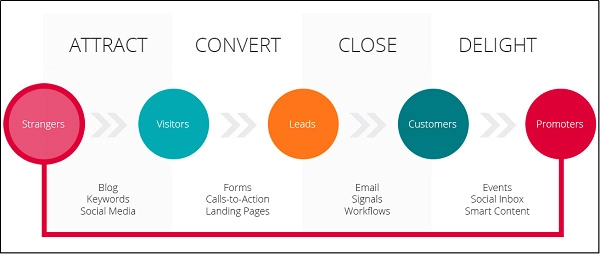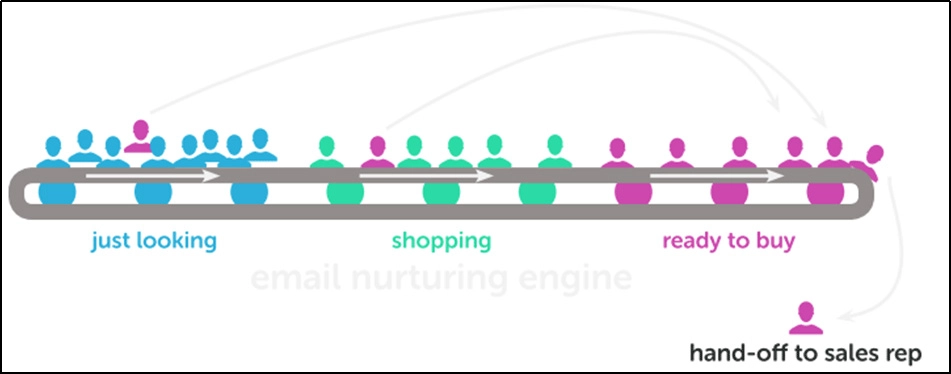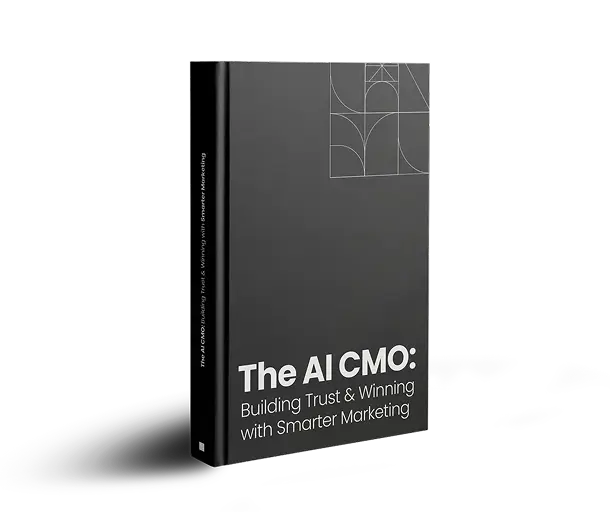
Introduction
B2B marketing has changed significantly over the years.
There is a total shift from outbound marketing tactics to inbound Lead generation strategies.
Just like in B2C selling, humanizing B2B marketing has become critical – it’s what drives the inbound approach to marketing.
The reality is that your prospects and customers are not just looking for someone to respond to basic questions. They want to take the interaction further and engage experts on how they can creatively use their offerings to grow their brands.
As a B2B marketer, you need to know why prospects or customers want to engage with you to humanize your interactions with prospects and draw them in. This means focusing B2B marketing efforts towards attracting prospects.
But with statistics showing that 96% of prospects that visit your site are not sales-ready, things don’t stop here. The visitors that you attract to your site have to be pushed down the sales funnel through a lead nurturing process.
The easiest way to do this is to provide content that is both relevant and helpful. But how can B2B companies use automation to add value to prospects in every stage of the purchase journey?
In this article, we explore the role of automation in humanizing B2B marketing and getting more inbounds Leads for your business
Marketing Automation and What It Entails?
With the advent of digital marketing, marketing automation is considered the most valuable tool that businesses use to get, manage and even close deals with prospects that get into the lead pipeline. According to Salesforce, automation refers to the “process of using software to complete repetitive marketing tasks designed to nurture sales leads, personalize marketing messages and content and in the process, save marketers’ time and effort.” A good automation software generates inbound Leads by attracting prospects, scores leads, grading them, nurturing them and qualifying leads that sales teams can pursue.The Link Between Automation and Inbounds
Prior to turning leads into customers, B2B marketers have to attract those leads and capture them.
The inbound Lead generation approach provides the perfect solution for attracting visitors through different channels through social media campaigns, content production and SEO strategies that address the concerns that a company’s target audience may be having.
Once on the company website, visitors interact with content, and depending on whether it meets their needs or piques their interest, subscribe to your email list. Upon signing up to your email list, the visitors become leads.

This means you need to nurture them through their buying journey – this is where automation comes in handy. Combined with automation, inbound marketing becomes a powerful machine for generating leads for B2B companies.
The Role of Marketing Automation in Getting Inbound Leads
There are several ways automation helps B2B marketers in getting inbounds. These are:
1. Gives a Broad View of Inbounds
Identifying and qualifying inbounds can be a complex process for any business – particularly when the target prospects are elusive or high-profile executives. If done manually, it can take a long time to analyze websites, gather phone data and even contact other staff within the marketing department.
Automation makes this process easy and fast. Using automation software, B2B marketers can get a broad view of leads generated through different channels within minutes. Beyond this, marketers use automation to do the following to get inbounds:
A. Monitor Lead Behavior
Automation gives marketers and sales reps valuable insights about leads. For instance, they are able to see which website pages leads have visited, emails that they’ve opened and lead capture forms that have been completed. By tracking the behavior of leads, marketers and salespersons can respond to their leads faster and even build relationships with them quickly.
B. Qualify Leads
Lead qualification process requires marketers to gather information from their leads. While gathering this information is important, it can be a tedious, time consuming process if done manually. Marketing automation tools enable companies to generate sales information such as company history, size and contact information automatically. When integrated with CRMs, these tools provide B2B companies with a wide range of information to facilitate lead qualification.
C. Score Leads
Most marketing automation software come with simplified lead scoring models that make it easy for B2B marketers to identify and qualify leads. The software score leads based on how company information, website interactions content engagement trends. Hot leads are prioritized quickly and sales reps can focus their attention on them to close deals.
2. Simplifies Lead Segmentation
Lead segmentation is an important step in identifying and nurturing leads. By gathering information about leads and scoring them, automation makes segmentation a breeze for B2B marketers. Segmentation involves separating contacts based on various aspects including:
- Purchase journey stage
- Interests
- Language
- Job title
- Industry
- Company size
Segmentation allows companies to send prospects and customers content that resonates with their needs. B2B buyers have varying needs at every stage of their buying journey. Lead nurturing content should be aligned to these needs.

Here’s how automation can help B2B marketers to humanize their interactions in every stage of the buyer’s journey:
- Awareness Stage: Here, prospects are researching solutions to a problem they have and don’t need to be sold to directly. B2B companies can create simple 2-step email campaigns that induce them to prospects and show them how they can help them solve the problem.
- Consideration Stage: At this point, prospects have started shopping for solutions. B2B companies should develop focus responses based on prospect’s interests as reflected by the frequency of visiting websites, product or service page views and content downloaded. Automation software can be used to deliver targeted emails with relevant content to customers who are in this stage.
- Decision Stage: Prospects who are in this stage are ready to make a purchase. Automation can be used to deliver content that enables them to make the purchase including product demos, customer testimonials, case studies and customer reviews.
By using automation to engage and nurture leads, marketers are able to prepare leads well before handing them over to the sales team.
3. Maintains Brand Visibility
B2B marketers would have a pretty easy time if leads would become customers with just one interaction. But this is not the case – marketers have to leverage multiple touchpoints to push leads down the sales funnel until they are ready to make a purchase.
Automation allows marketers to automate their email marketing efforts to handle multiple touchpoints through newsletters or drip campaigns. Email nurturing campaigns are spaced out to give leads educational content that empowers them to make better decisions without pressuring them.
As marketers leverage automation to do this, they keep their brands on the mind of prospects throughout. This means that when your prospects are ready to make a purchase, they’ll most likely buy from you.
4. Manages Routine Tasks
To successfully convert leads into paying customers, sales and marketing teams in B2B companies must build and strengthen relationships. This can be an uphill task when they have numerous routine tasks in their hands.
Automation softwares are designed to handle routine tasks, freeing B2B marketing and sales teams to focus on more important tasks like building quality relationships with high value leads.
By doing so, companies are able to achieve their sales revenue goals while keeping staffing costs low.
At the same time, automation allows B2B companies to store everything in a central place and can be accessed without confusion. Tasks can be created by specifying as many details as possible.
This includes linking tasks to specific deals or contacts, classifying tasks into email, calls, demos or free trials and setting due dates for each task. Sales and marketing can also assign other people tasks using automation.
5. Gathers Analytical Data
The best thing about automation software is its ability to collect data about leads and customers. Leveraging it gives B2B marketers better insights about their leads.
The data is instrumental in informing decisions on the focus of marketing efforts and the budgets that would be involved. Through use of data, B2B companies are able to engage their prospects in amore personalized and better way. More over, automation software displays performance results.
This enables sales and marketing teams to see how their various engagement efforts are doing. For instance, B2B marketers that run automated lead generation campaigns can examine different performance parameters to determine which strategies are effective. Some metrics that they can track include:
- Conversions
- Click-through rates
- Email open rates
- Subscription rates
- Free trial registration
- Demo requests
Tracking these metrics ensures that marketing teams are able to score high quality that once passed on to sales teams, have a high chance of converting to customers. As a result, the sales teams focus their time and effort on leads that are ready to buy, which enables the company to increase its sales revenue significantly.
Automate and Grow
Whether you are running a large or a startup B2B company, embracing marketing automation can be a game changer in the way you get and nurture inbounds. With automation, you can attract and nurture high quality inbounds that your company needs to grow to the next level. Find an appropriate automation software for your business today and let it play the key role of getting you inbound Leads that your business needs.
Our blog
Latest blog posts
Tool and strategies modern teams need to help their companies grow.

Video has emerged as one of the most effective tools to cut through the noise and con...

The way B2B buyers research, engage, and decide has changed and so must the way marke...

Channel marketing helps B2B companies grow by partnering with third-party sellers. It...






